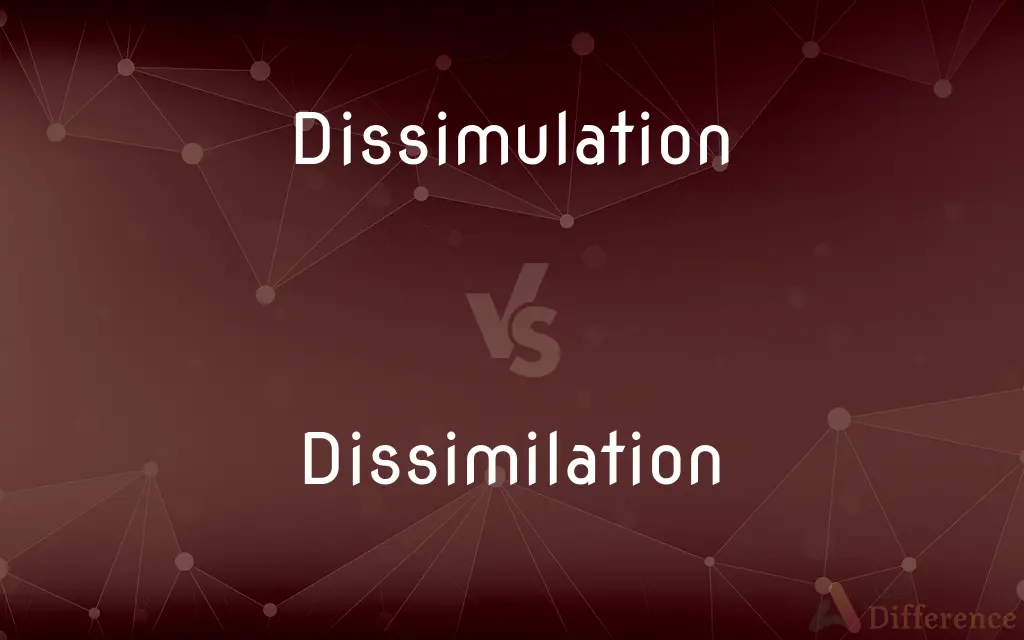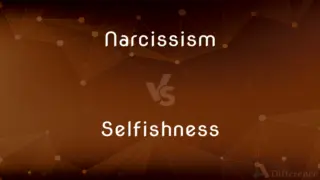Dissimulation vs. Dissimilation — What's the Difference?
By Tayyaba Rehman & Fiza Rafique — Published on September 20, 2023
Dissimulation is the act of hiding one's true feelings or intentions, often by lying. Dissimilation is a linguistic process where similar consecutive sounds in a word become less alike for easier articulation.

Difference Between Dissimulation and Dissimilation
Table of Contents
ADVERTISEMENT
Key Differences
Dissimulation is a term most commonly used to describe deceptive behavior or speech designed to disguise one's true feelings, motives, or actions. Dissimilation, on the other hand, is a technical term in linguistics referring to the process of changing adjacent similar sounds within words to make them less alike. Dissimulation is often considered a form of dishonesty, while dissimilation is simply a phonological phenomenon that happens naturally in languages.
Dissimulation is closely related to the concepts of deceit, lying, and concealment. It involves presenting a false image or withholding the truth to achieve a particular outcome. Dissimilation in linguistics, however, is devoid of any moral or ethical connotations. It is a process that contributes to the evolution of language, making words easier to pronounce or distinguish.
In the realm of human behavior, dissimulation can be viewed negatively, as it often involves deceit. Dissimilation is morally neutral; it’s just a feature of how languages change and adapt over time. Thus, dissimulation has an ethical dimension, whereas dissimilation does not.
In summary, dissimulation and dissimilation serve different purposes in different contexts. Dissimulation is about hiding true feelings or intentions, usually for self-gain or to avoid negative consequences. Dissimilation is a linguistic phenomenon that alters word forms for ease of pronunciation. They are entirely different terms that operate in different realms—behavioral psychology for dissimulation and linguistics for dissimilation.
Comparison Chart
Field
Psychology, Behavior
Linguistics
ADVERTISEMENT
Intent
To deceive or hide truth
To make pronunciation easier
Moral Implication
Often viewed negatively
Morally neutral
Examples
Lying, pretending
Changing "probably" to "probly"
Usage
Everyday language
Technical, specific to linguistics
Compare with Definitions
Dissimulation
A tactic to mislead or disguise.
His dissimulation was a strategic move to win the negotiation.
Dissimilation
A linguistic strategy to reduce similarity between adjacent sounds.
Dissimilation in some dialects causes 'library' to be pronounced as 'libary.'
Dissimulation
Intentional obfuscation to deceive others.
The politician's dissimulation made it difficult to trust him.
Dissimilation
The transformation of phonemes for easier articulation.
The dissimilation in the word 'caterpillar' often leads to the pronunciation 'catapillar.'
Dissimulation
The act of concealing one's true feelings or motives.
His dissimulation was so convincing that no one suspected he was the spy.
Dissimilation
The change of one sound in a word due to the influence of another.
Dissimilation can occur in dialects, such as dropping the 'r' in 'February.'
Dissimulation
The hiding of one's true self.
Her dissimulation was so complete that she fooled even her closest friends.
Dissimilation
A phonological phenomenon modifying syllable structure.
In English, dissimilation can make words easier to pronounce.
Dissimulation
A form of deceit involving a false appearance.
Jane's dissimulation fooled everyone into thinking she was happy.
Dissimilation
A linguistic process that alters adjacent similar sounds.
Dissimilation changed the pronunciation of 'February' to 'Febuary' for some speakers.
Dissimulation
To conceal (one's intentions, for example) under a feigned appearance.
Dissimilation
In phonology, particularly within historical linguistics, dissimilation is a phenomenon whereby similar consonants or vowels in a word become less similar. In English, dissimilation is particularly common with liquid consonants such as /r/ and /l/ when they occur in a sequence.
Dissimulation
To conceal one's true feelings or intentions.
Dissimilation
The act or process of making or becoming dissimilar.
Dissimulation
The act of concealing the truth; hypocrisy or deception.
Dissimilation
(Linguistics) The process by which one of two similar or identical sounds in a word becomes less like the other, such as the l in English marble (from French marbre).
Dissimulation
Hiding one's feelings or intentions.
Dissimilation
The act of dissimilating, of making dissimilar.
Dissimulation
The act of dissembling; a hiding under a false appearance; concealment by feigning; false pretension; hypocrisy.
Let love be without dissimulation.
Dissimulation . . . when a man lets fall signs and arguments that he is not that he is.
Simulation is a pretense of what is not, and dissimulation a concealment of what is.
Dissimilation
(phonology) A phenomenon whereby similar consonant or vowel sounds in a word become less similar, resulting in a form that is easier for the listener to perceive.
Dissimulation
The act of deceiving
Dissimilation
The act of making dissimilar.
Dissimilation
A linguistic process by which one of two similar sounds in a word becomes less like the other;
The Old French MARBRE became the English MARBLE by dissimilation
Dissimilation
Breakdown of more complex substances into simpler ones with release of energy
Common Curiosities
What is Dissimilation?
Dissimilation is a linguistic process that changes similar consecutive sounds to make them less alike.
Where is Dissimulation most commonly used?
In psychology and everyday behavior.
Does Dissimilation have moral implications?
No, it is simply a feature of how language evolves.
Where is Dissimilation most commonly used?
In linguistics.
Does Dissimilation affect the spelling of words?
Typically no, it affects pronunciation.
What is Dissimulation?
Dissimulation is the act of hiding your true feelings, intentions, or actions.
Is Dissimulation considered negative?
Often yes, as it involves deceit or hiding the truth.
Is Dissimilation related to language change?
Yes, it's a part of phonological evolution in languages.
Does Dissimilation occur in all languages?
It's a common but not universal feature in languages.
Is Dissimulation related to lying?
Yes, it often involves lying or deceit.
Can Dissimulation be a strategic choice?
Yes, some may use it as a tactic to achieve specific goals.
Are Dissimulation and Dissimilation ever used together?
Generally not, as they pertain to different fields—behavioral psychology for dissimulation and linguistics for dissimilation.
Does Dissimulation involve emotions?
Often yes, as it hides true feelings or intentions.
Is Dissimilation intentional?
Generally no, it’s a natural linguistic process.
Can Dissimulation be detected?
Sometimes, through inconsistencies in behavior or speech.
Share Your Discovery

Previous Comparison
Profit Margin vs. Markup
Next Comparison
Narcissism vs. SelfishnessAuthor Spotlight
Written by
Tayyaba RehmanTayyaba Rehman is a distinguished writer, currently serving as a primary contributor to askdifference.com. As a researcher in semantics and etymology, Tayyaba's passion for the complexity of languages and their distinctions has found a perfect home on the platform. Tayyaba delves into the intricacies of language, distinguishing between commonly confused words and phrases, thereby providing clarity for readers worldwide.
Co-written by
Fiza RafiqueFiza Rafique is a skilled content writer at AskDifference.com, where she meticulously refines and enhances written pieces. Drawing from her vast editorial expertise, Fiza ensures clarity, accuracy, and precision in every article. Passionate about language, she continually seeks to elevate the quality of content for readers worldwide.














































